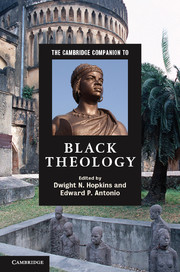Book contents
- Frontmatter
- Part I Introduction
- Part II Themes in black theology
- Part III Global expressions of black theology
- 16 The history of black theology in South Africa
- 17 Black theology in Britain
- 18 Slave religion and black theology in Brazil
- 19 Black theology in Cuba
- 20 Black theology in Jamaica
- 21 Methodology in an Aboriginal theology
- 22 Black theology and postcolonial discourse
- 23 The future of black theology
- Further reading
- Index
- Other titles in the series
17 - Black theology in Britain
from Part III - Global expressions of black theology
Published online by Cambridge University Press: 28 September 2012
- Frontmatter
- Part I Introduction
- Part II Themes in black theology
- Part III Global expressions of black theology
- 16 The history of black theology in South Africa
- 17 Black theology in Britain
- 18 Slave religion and black theology in Brazil
- 19 Black theology in Cuba
- 20 Black theology in Jamaica
- 21 Methodology in an Aboriginal theology
- 22 Black theology and postcolonial discourse
- 23 The future of black theology
- Further reading
- Index
- Other titles in the series
Summary
One of the overarching difficulties in seeking to articulate the definitional intent and ideological positionality of black theology in Britain is that of seeking to construct a working “mythology” in which to locate one's epistemological work. In the US context, for instance (from which black British theology has derived much of its inspiration and nurturing), there remains a potent and visceral narrative of African American identity and positionality within the body politic of that nation. The legacy of chattel slavery as depicted by Dwight Hopkins, Anthony Pinn, and others has outlined the historical and theological features that underscore black existence in the American continent. For many of “us,” black British life is best understood in terms of the mass migration of black people from the Caribbean islands of the British Empire to the United Kingdom between 1948 and 1965.
A helpful means of deciphering this ongoing problem is to investigate the thorny question of acceptable nomenclatures for being black in Britain. For most black Americans, the designation African American is a straightforward descriptor for what it means to be a person of African descent living in the United States of America. In Britain, many black people, such as myself, will describe themselves as African Caribbean. This descriptor is indicative of one's heritage and ethnicity, but tells us nothing about one's nationality.
- Type
- Chapter
- Information
- The Cambridge Companion to Black Theology , pp. 234 - 244Publisher: Cambridge University PressPrint publication year: 2012

